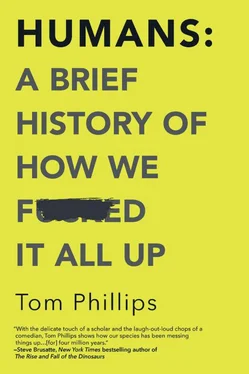Tom Phillips - Humans - A Brief History of How We F*cked It All Up
Здесь есть возможность читать онлайн «Tom Phillips - Humans - A Brief History of How We F*cked It All Up» весь текст электронной книги совершенно бесплатно (целиком полную версию без сокращений). В некоторых случаях можно слушать аудио, скачать через торрент в формате fb2 и присутствует краткое содержание. Город: Toronto, Год выпуска: 2019, ISBN: 2019, Издательство: Hanover Square Press, Жанр: История, Юмористические книги, на английском языке. Описание произведения, (предисловие) а так же отзывы посетителей доступны на портале библиотеки ЛибКат.
- Название:Humans: A Brief History of How We F*cked It All Up
- Автор:
- Издательство:Hanover Square Press
- Жанр:
- Год:2019
- Город:Toronto
- ISBN:978-1-48805-113-5
- Рейтинг книги:4 / 5. Голосов: 1
-
Избранное:Добавить в избранное
- Отзывы:
-
Ваша оценка:
- 80
- 1
- 2
- 3
- 4
- 5
Humans: A Brief History of How We F*cked It All Up: краткое содержание, описание и аннотация
Предлагаем к чтению аннотацию, описание, краткое содержание или предисловие (зависит от того, что написал сам автор книги «Humans: A Brief History of How We F*cked It All Up»). Если вы не нашли необходимую информацию о книге — напишите в комментариях, мы постараемся отыскать её.
Humans: A Brief History of How We F*cked It All Up — читать онлайн бесплатно полную книгу (весь текст) целиком
Ниже представлен текст книги, разбитый по страницам. Система сохранения места последней прочитанной страницы, позволяет с удобством читать онлайн бесплатно книгу «Humans: A Brief History of How We F*cked It All Up», без необходимости каждый раз заново искать на чём Вы остановились. Поставьте закладку, и сможете в любой момент перейти на страницу, на которой закончили чтение.
Интервал:
Закладка:
Cryptocurrencies don’t have any intrinsic value, and by design most don’t have any kind of central authority to regulate and control their flow. The only limiting factor is the cost of the computing you need to do to create and exchange them. But the belief among some people that they’re the currency of the future has led to many cryptocurrencies surging in value, as everybody agrees that they’re worth something—or, at the very least, that there’ll be another sucker along in a minute who thinks they’re worth more than you do, until all of a sudden there isn’t. So their value has become wildly volatile, depending entirely on the mood of the market. It’s a classic financial mania, bubbles forming and bursting over and over again, as everybody tries to not be the one left holding a suddenly worthless parcel when the music stops.
But like most manias, it has real-world effects. It’s not just Australia reopening a power plant: in the rural west of America, 170 years after the gold rushes first brought people flooding west, tempted by the prospect of overnight riches, there’s a new gold rush happening. Lured by cheap power and cheap rent and space to build, cryptocurrency firms are investing hundreds of millions creating huge, power-hungry crypto-mines in small country towns across Washington, Montana, Nevada and more. Residents of one town where these twenty-first-century prospectors have moved in complain that the around-the-clock roar of the servers is keeping them awake, affecting their health and driving away local wildlife.
By the end of 2018, one estimate predicts that Bitcoin mining alone will use as much energy as the entire country of Austria.
This book has been about the failures and mistakes we’ve made in the past. But what about the mistakes we’re making right now, and the ones we’ll make in years to come? What shape might the fuck-ups of the future take?
Making predictions is, as we’ve noted, a sure-fire way to make yourself look stupid to historians further down the line. Maybe the decades and centuries ahead will see humanity commit a whole series of completely original, novel mistakes; maybe we’ll find a way to stop making mistakes at all. But if you were of a mind to put money on it, a sensible bet would be that we’ll probably carry on making the exact same mistakes as we have in the past.
Let’s start with the obvious, then.
Of all the stuff we’ve just casually dumped into the environment on the grounds that, eh, it’ll probably be fine, it’s the carbon we’ve been merrily burning up since the Industrial Revolution kicked off that’s going to really spoil everybody’s good times.
That man-made climate change is real, and potentially an existential threat to many communities around the world and many aspects of civilization, is so well established as a scientific fact by this point that it seems kind of dull to run over the evidence again. We’re way beyond the point where this might all be another polywater or N-ray-type situation that everybody’s going to be embarrassed about in a few years’ time. And yet apparently there are still plenty of people who have enough reasons to deny it—financial, political, the sheer bloody-minded joy of being a contrarian knobber—that we keep getting dragged back to the “debate about whether it’s real” stage every time it looks like we might make some progress on the “actually do something about it” stage. It’s pretty much the playbook the manufacturers of leaded gasoline used back in the day: you don’t need to disprove something, you just need to be able to claim the jury’s out long enough to keep raking in that sweet, sweet profit.
And so we’re doing the collective version of “lalalalala can’t hear you,” when instead we should probably be running around in a panic like our house was on fire, which… it sort of is. Seventeen of the hottest eighteen years on record have occurred since the year 2000. For the first time in our geological epoch, the level of carbon dioxide in the atmosphere crossed the threshold of 410 parts per million in April 2018. The last time it was this high was during the mid-Pleistocene warm period, around 3.2 million years ago—right when Lucy was falling out of her tree. In case you’re thinking, oh well, if it’s been that high before, it can’t be too bad, at that time sea levels were over 60 feet higher than they are today.
Oh, and climate change isn’t the only thing that carbon dioxide is doing. In fact, one of the things keeping a check on the amount of CO2 in the atmosphere is that the oceans absorb some of it. Good news, hey? Turns out not. Ocean water, much like your boyfriend, is fairly basic—which is to say, it leans very slightly more toward the alkaline than the acid. But absorbing all that CO2 turns it more acidic, and the more acidic the ocean is, the greater the knock-on effect on marine life, from tiny mollusks to big fish.
Oh, also that gets worse if it happens in combination with the oceans warming up. Which they are. If you want an example of just how bad things are getting in the water, the Great Barrier Reef—one of the actual wonders of the actual natural world —is dying at an alarming rate, with two years in a row of massive “bleaching” events killing corals across large sections of the reef.
Guys… I think we might have fucked this up a bit.
Of course, that’s far from the only doom we’ve been energetically and determinedly setting ourselves up for. We’ve given ourselves options here, people. For example: in May 2018, it was reported that scientists had detected a sharp rise in chlorofluorocarbon emissions. Somewhere in the world, likely in Asia, someone’s started manufacturing Thomas Midgley’s supposedly banned invention again. It could set the ozone layer’s recovery back by a decade. Good work on the “learning from our mistakes” front, guys.
Or take antimicrobial resistance. Antibiotics and other antimicrobial medicines were one of the greatest steps forward of the twentieth century, saving countless lives. But, like the people of Easter Island cutting down their trees, we used them too much, too often. The thing is, every time you use an antibiotic, you’re increasing the chances that one of those microbes will be resistant to it—and then you’re just killing off their competition. It’s accelerated evolution, as our actions breed new strains of antibiotic-resistant superbugs that have the potential to bring all the bad old diseases of history flooding back (and it doesn’t even need the tundra to melt to do it).
As a result, the world is rapidly running out of effective antibiotics—and part of the problem is that antibiotics simply aren’t profitable enough for drug companies to invest sufficient resources into creating new ones. One estimate suggests that already 700,000 people every year die from antimicrobial-resistant diseases.
Or maybe our downfall will come because we keep outsourcing our decisions to computer algorithms, in the hope that this somehow makes them better and wiser, and that it won’t be our fault when they go wrong. The algorithms that control self-driving cars are just one example: elsewhere algorithms are deciding what stocks to buy and sell, what news we see on our social media, and how likely it is that someone convicted of a crime will reoffend. We like to think that these will be more rational than humans; in reality, they’re just as likely to amplify all the biases and faulty assumptions we feed into them.
The worry about outsourcing our decisions to computers doesn’t stop there, as research on artificial intelligence progresses apace. The fear here is that if we do manage to create an AI that’s far smarter and more capable than humans, we might be mistaken in thinking it’ll be on our side. It might be able to manipulate us to its own ends, it may see us as a threat and destroy us or it may simply fail to recognize that humans are important, and we’ll end up being little more than fodder for its goal of creating as many paper clips as possible (or whatever other task we’ve set it). The prospect that we might Frankenstein ourselves into oblivion may seem remote, but a worryingly large number of supposedly smart people appear to be taking the prospect quite seriously.
Читать дальшеИнтервал:
Закладка:
Похожие книги на «Humans: A Brief History of How We F*cked It All Up»
Представляем Вашему вниманию похожие книги на «Humans: A Brief History of How We F*cked It All Up» списком для выбора. Мы отобрали схожую по названию и смыслу литературу в надежде предоставить читателям больше вариантов отыскать новые, интересные, ещё непрочитанные произведения.
Обсуждение, отзывы о книге «Humans: A Brief History of How We F*cked It All Up» и просто собственные мнения читателей. Оставьте ваши комментарии, напишите, что Вы думаете о произведении, его смысле или главных героях. Укажите что конкретно понравилось, а что нет, и почему Вы так считаете.












